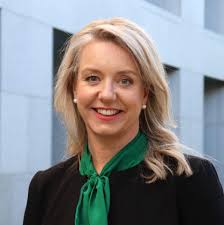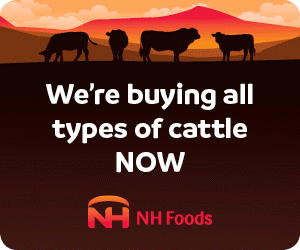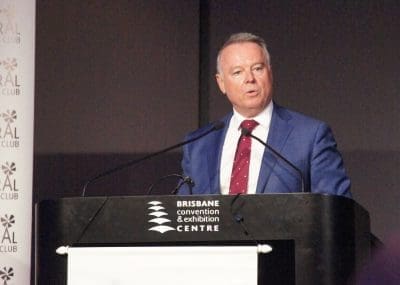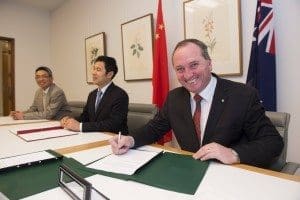FEDERAL Parliament has passed new laws to introduce independent oversight of the $1.7 billion live export industry, to boost animal welfare outcomes and further enhance Australia’s position as a “world leader”.
The Bill’s passage will see a process established for the ministerial appointment of an Inspector-General of Live Animal Exports, to provide greater overall scrutiny of the trade; in particular the Agriculture Department’s regulatory role and “culture”.
Agriculture Minister Bridget McKenzie said the Inspector-General’s role “cemented” Australia’s position as the “world leader in livestock exports” and in improving animal welfare outcomes.

Minister for Agriculture BridgetMcKenzie.
“Our livestock export industry contributes $1.7 billion to the national economy every year and is a vital source of revenue and jobs to our rural and regional economies,” she said.
“The independent role will give the community strong assurance and greater transparency around how the trade is regulated and how well it is running.”
During the Bill’s Second Reading speech, Liberal MP David Coleman said the Inspector-General would be provided with the “necessary independence from government and the powers to deliver a robust accountability and assurance function”.
“An Inspector-General will promote continual improvements in the regulatory practice, performance and culture of the Department of Agriculture in its role as the regulator of Australia’s livestock exports,” he said.
“The Department’s focus on trade facilitation means that it is balancing competing factors in its role as the regulator of live animal exports.
“Establishing an Inspector-General is part of a broader strategy to develop and maintain an effective regulatory culture that will deliver animal welfare outcomes consistent with the Australian Standards for the Export of Livestock (ASEL) and the best available science.”
Appointment yet to be made
Senator McKenzie said now that the Bill had passed the House of Representatives it would then need Royal Assent, after which she’d then appoint a “suitably qualified person to get to work”.
 She said the position would allow the live industry to “continue on its trajectory of positive change while boosting regulator performance and transparency of decision making for the Australian community”.
She said the position would allow the live industry to “continue on its trajectory of positive change while boosting regulator performance and transparency of decision making for the Australian community”.
The independent Inspector-General was a recommendation arising from the Moss Review conducted last year to examine the regulatory function and culture of the Agriculture Department, in regards to live exports.
It was implemented in response to the Awassi Express voyage to the Middle East in August 2017 which experienced about 2500 sheep mortalities and ignited political and public backlash after video footage was broadcast on television in April 2018, highlighting animal welfare issues.
The Federal Coalition Government accepted all recommendations for further reforms from the Moss Review and in March this year Ross Carter was made the interim Inspector-General, pending the legislation’s passage.
However, industry and government sources were tight-lipped and declined to comment or speculate on who would be appointed to the position, once the new legislation is ultimately formalised, or if Mr Carter would continue.
Exporters welcome new oversight
The Australian Livestock Exporters’ Council (ALEC) welcomed the legislation passing Federal Parliament last week, saying it was “further proof “of the Government’s continued commitment to supporting, sustaining and improving the trade which provided thousands of jobs, especially in regional areas.
 ALEC CEO Mark Harvey-Sutton said the Inspector-General’s appointment would, “only enhance our systems and improve regulator performance and provide the community with greater transparency and further reassurance that we are an important and sustainable industry for Australia.”
ALEC CEO Mark Harvey-Sutton said the Inspector-General’s appointment would, “only enhance our systems and improve regulator performance and provide the community with greater transparency and further reassurance that we are an important and sustainable industry for Australia.”
“The current Interim Inspector-General Mr Ross Carter is currently working with industry, speaking with people throughout the supply chain and making an extremely positive impression,” he said.
“As an industry we want transparency, the facts to be acknowledged and to be listened too.
“We are world leaders in the live export trade and we value the objectivity the Inspector-General will bring to the industry and for the public reassurance that animal welfare is of the highest standard.
“The livestock export industry is determined to continually achieve improvements in the industry’s sustainability and animal welfare outcomes, building on the genuine care producers, exporters and importers have for the animals in the supply chains.”
According to figures from the Australian Bureau of Statistics, from 2014 to 2018 more than 15 million sheep and cattle have been exported to different markets such as the Middle East, Vietnam and Indonesia, representing about $8 billion to the national economy.
National Farmers’ Federation CEO Tony Mahar said the Inspector General position was “a positive move by the government, which will enhance transparency and build industry and community confidence in the regulation of live exports”.
“The agriculture industry stands ready to engage with the Inspector General as he commences his work program – it is critical that we are all working together to ensure a culture of continuous, evidence-based improvement,” he said.
RSPCA Australia said the Moss Review highlighted “culture issues at the Department and the Inspector-General wouldn’t be a “panacea to the inherent animal welfare problems in the live export trade, but added accountability and stronger regulation is a positive step forward”.
Joyce and Fitzgibbon tensions flare-up again
Shadow Agriculture Minister Joel Fitzgibbon slammed the Coalition during debate on the Bill last week saying it represented “a total capitulation” by the Government, over the question of an Inspector-General.

Joel Fitzgibbon addresses Thursday’s Queensland Rural Press Club gathering.
Mr Fitzgibbon said if the Coalition hadn’t “torn up” much of the former Labor Government’s work in response to the 2011 Indonesian live cattle ban – including an interim Inspector-General of Animal Welfare and Live Animal Exports which, as Minister, he established prior to the 2013 election through legislation that needed to pass Parliament, but was let to lapse by the newly installed Coalition Government – “we might never have had an Awassi affair”.
“The world as we knew it was going to come to an end if we had an Inspector-General of Animal Welfare and Live Animal Exports,” he said.
“…the National Farmers’ Federation, the Cattle Council and the live exporters council also basically said that this would be a terrible thing for the industry – shocking regulation; unneeded.
“It’s interesting that, since the government capitulated and announced that they were going to embrace an Inspector-General, I’ve heard nothing from the National Farmers’ Federation, the Cattle Council or anyone else.
“People who represent the agricultural sector, or purport to, should learn that’s it’s not all about giving, giving, giving; sometimes people have to accept that reform is necessary if we’re going to maintain a social licence in some of these industries—and maintain a social licence we must.
“Some industries might be past it anyway.”
Mr Fitzgibbon said the Bill “does much of what we did or would have done in 2013” and the Inspector-General, “does not impose any additional regulation on live exporters”.
“If you like, he or she is the auditor of the regulator – he or she makes sure that, if something goes wrong, things are properly looked at and the regulator takes appropriate action,” he said.
“That doesn’t impose any burden whatsoever on live exporters.”
Mr Fitzgibbon said he’d also welcomed the Inspector-General, as Labor’s version did, having “a significant work program” including three-year reviews, monitoring and reporting during livestock export voyages, livestock export licensing and permits, reviewing ESCAS and ASEL and “just generally making sure over time that things are properly running within the regulator”.
“That’s a very sensible proposition, and we welcome the fact that the Government will now do this,” he said.
“The best way to ensure that the industry maintains a social licence is to talk about animal welfare and to transparently demonstrate that we have a plan together, working with industry, to ensure the highest standards of animal welfare.
“We shouldn’t have had to wait six years.
“…there were a number of incidents over the last six years we probably wouldn’t have had and didn’t need to have.
“If we had not had them, the export industry would be in much better shape.”

Mr CAI Wei, Deputy Head of Mission / Minister, Embassy of the People’s Republic of China in Australia; Dr LI Jianwei, Director General, AQSIQ; Minister Joyce
Minister Joyce signing the protocol for feeder/slaughter cattle.
New England Nationals MP Barnaby Joyce hit back at Mr Fitzgibbon’s criticisms of his time as Agriculture Minister saying he was “absolutely proud” of his efforts to expand the live sheep trade to record numbers which underpinned prices to farming families and yielded broader economic impacts in regional communities.
He also attacked Labor’s policy of wanting to shut down the live sheep trade.
“If there is a Miley Cyrus wrecking ball that is going to go through regional Australia…it will be what the Labor Party does to the live sheep trade,” he said.
“…..they haven’t learnt a lesson; they are going to do it again with the live sheep trade.
“The lefties will take over the show again – they will ban the live cattle trade.
“The lefties will come back again and ban the transport industry.
“And who will suffer? The people of regional Australia.”
Independent umpire
WA Liberal MP Rick Wilson said the intent of the Bill was “very worthy” – to improve animal welfare outcomes while holding “radical animal activist groups” to account – with his speech highlighting concerns about the influence of payments made to deck hands, for video footage from the Awassi voyage.
“We need to honour those Middle Eastern markets that value our product and have invested a lot of money in the supply chain and the infrastructure to ship our sheep,” he said.
“We need to balance that, of course, with welfare outcomes – but good welfare outcomes don’t necessarily happen when we have animal welfare organisations inducing very low-paid deckhands to provide footage of animals suffering so that they can further their agenda to close the trade down.”
Mr Wilson said the Bill would provide the industry with an “independent umpire” to act as the go-between for the regulator, the department, the industry and animal welfare groups that “follow the industry very closely”.
“I see the role of the Inspector-General as being not only to oversee the regulation of the industry and make sure that it’s done appropriately and properly, and not only to liaise with the industry and make sure that they are doing the right thing, but also to ensure that these radical animal activist groups are held to account for the sorts of activities that they’ve been getting up to over many years and continue to get up to to this day,” he said.
South Australian Liberal MP Rowan Ramsey said the new legislation “builds on success…cleaning up the live sheep trade in particular and the live export trade generally”.
“The Government has, since 2013, in the wake of the 2011 suspension of the live cattle trade to Indonesia, sought to rebuild the trust of the Australian public in this trade,” he said, with reference to improved animal welfare outcomes from the Exporter Supply Chain Assurance System.
“This demand by Australia – that if you want to get Australian livestock you have to meet these standards – has had a knock-on effect for all animals that are slaughtered pretty much all over the world, certainly in the markets that import Australian livestock, because, as facilities are upgraded, local stock are treated in the same manner,” he said
“Those of us in the industry know that if you treat animals correctly, if you keep stress levels down, you’ll actually end up with a better product at the end of the chain.
“So, if countries and recipients of Australian animals don’t do the right thing, they don’t get the livestock.
“It will be the Inspector-General’s job to continue the improvements in the industry, to monitor the industry and to provide what I would call oversight of the industry or an audit of it.”
Queensland Nationals MP Ken O’Dowd said the Bill was a “step forward” in providing greater assurance for all industry operators generating broad economic benefits and improved confidence for the general public on animal welfare outcomes.
“The Bill will drive a positive change to the industry, improving regulatory practices, performance and the culture of the regulatory system,” he said.
“There are benefits Australia-wide from the supply of cattle, sheep, buffalo and camels to various countries across the world.”
